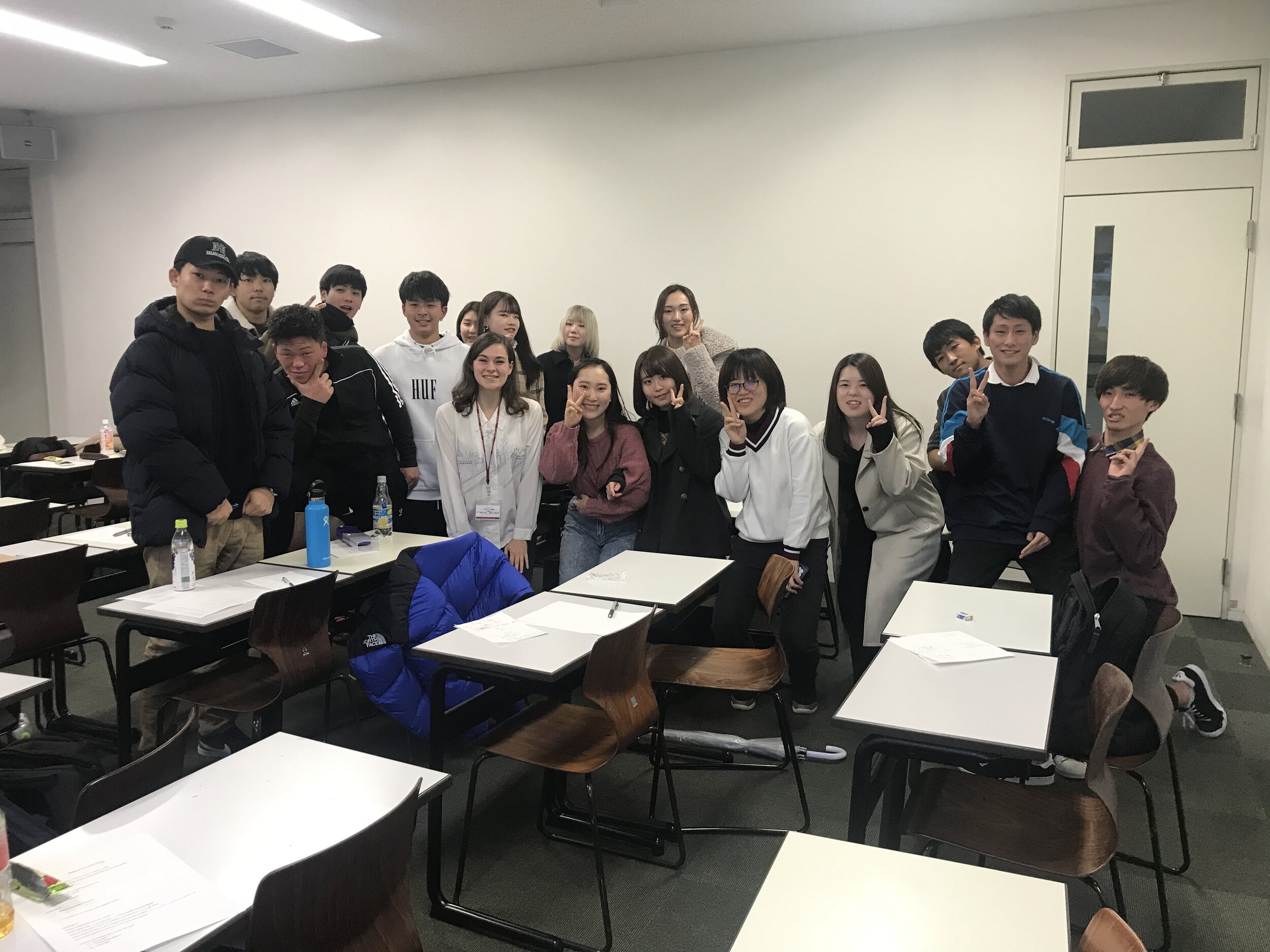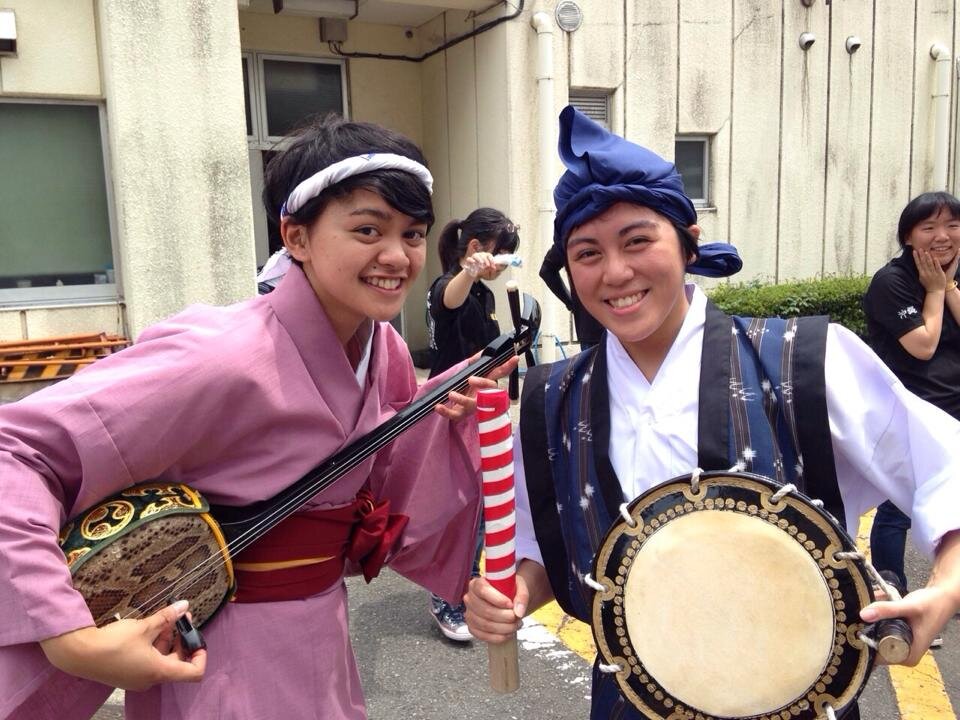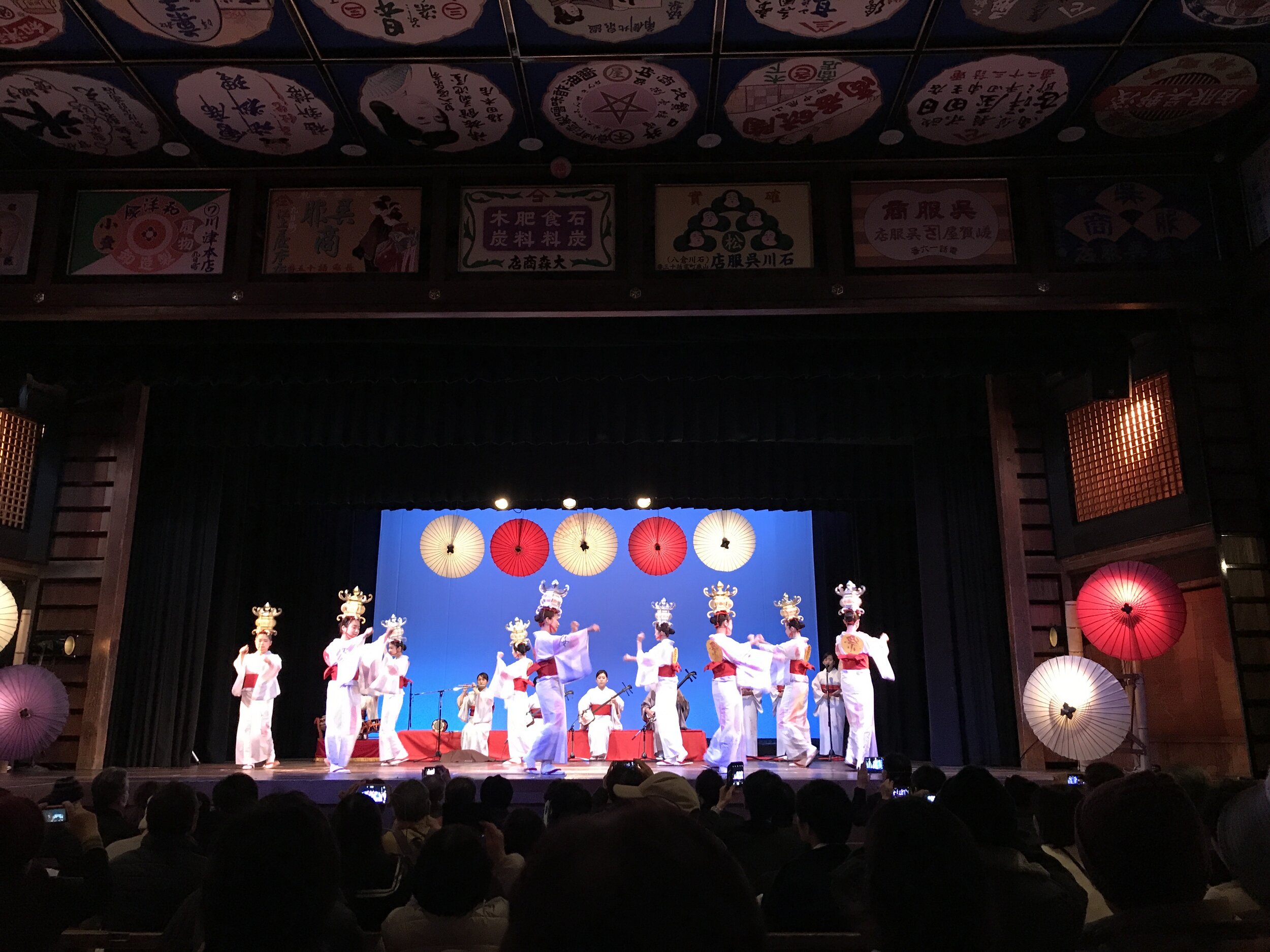
By Alex Billingsley ‘24, JFOU Fellow
Right now, I am sitting in a hospital room in midtown Tokyo, sunlight shining through the window from over the Tokyo Tower. Needless to say, my January has had some ups and downs, but this time of rest and recuperation is giving me plenty of space to reflect on these past six months since I landed at Haneda Airport. Every day has brought with it a new adventure, a new chance to carve out my life in Japan, and new opportunities that ride on the back of chances taken weeks and months before. I try to document these daily experiences every evening and – in what is sometimes a tiresome chore at 2 am before I crawl into bed – write a diary about my life.
By Sophie Qano ‘24, Hiroshima Fellow
Koyo (紅葉) is a word used to describe the change of foliage into vibrant fall colors. The same kanji is also used for Momiji (紅葉), or Japanese Maple Trees, with their vibrant red leaves being symbolic of Hiroshima and Miyajima.
By Risako Beddie ‘23, JFOU Fellow
This is Risa, reporting on my second year as a Shansi Fellow at J.F. Oberlin University in Machida, Japan. This year has been full of highs, especially in terms of my music, travels, and teaching. Please enjoy a glimpse of my world through photos.
By Risako Beddie ‘23, JFOU Fellow
Home, at Last:
There I was, one overweight suitcase in each hand, stumbling into the Haneda Airport lobby on a hot July afternoon to find my mother, curiously sporting a stylish bucket hat, waiting patiently by a sign that read, Narita EXpress →. I was scheduled to fly a day earlier, but managed to miss my 8am flight out of Cleveland the first time due to a combination of my own stupidity and a hair dye emergency.
By Leo Hidy ‘23 JFOU Fellow
From the JET program to the Interac ATL program, a quick Google search reveals an endless array of post-graduate fellowships that send English speakers to Japan. So then, out of the alphabet soup of ESL teaching fellowships, why choose Shansi?
By Zachary Mayer-Bickel ‘21, JFOU Fellow
When I arrived in Tokyo more than two years ago, I came with a lot of confidence and a lot of worry. On the one hand I was ready for almost anything living abroad in Japan could throw at me. By that time, I’d already lived in central Tokyo, traveled the country several times, and studied abroad in Kyoto. I'd already been sent home early from that study abroad due to the start of the Coronavirus pandemic. I had been through culture shock, learned to communicate, and navigated disasters.
By Zachary Mayer-Bickel ‘21, JFOU Fellow
It turns out having friends is important. This is not a shocking revelation to most people. It's the sort of saccharine sentiment found in books, television shows and movies aimed at elementary schoolers. But it's such a prevalent message because it holds true. For me, friendship and connection to other people has been the prevailing theme that all the best parts of my fellowship
By Benjamin Echikson ‘22, Hiroshima Fellow
I have lived in Hiroshima for about a year and a half now. You could say that I have gotten used to living in Japan, but there still is something “weird” about living alone and working in Japan. “Weird” in the way that I sometimes still find it hard to believe that I am no longer in the US or Europe.
By Benjamin Echikson ‘22, Hiroshima Fellow
I have been in Hiroshima for over four months, a milestone I feel has zipped by me in a flash. My time in Japan has been busy as I am juggling three jobs at UNITAR, ANT-Hiroshima, and Green Legacy Hiroshima, and then spending the rest of my free time traveling and searching for new places to eat.
By Leina Fieleke ‘21, JFOU Fellow 2021-2023
I’ll let you in on a secret. I used to hate learning Japanese.
By Leina Fieleke ‘21, JFOU Fellow
An art history professor I had at Oberlin would always take a moment after the class laughed at an artwork. “Why is this funny?” he would ask. Until then, not many people had asked me to explicitly express why something was funny. This is now, however, one of the most common questions I find myself asking while navigating a new country and culture.
By Jasmine Mitchell, JFOU Fellow
During my time at Oberlin, I always explored unique research topics centered around Blackness Abroad. My fascination with this topic led me to study the historical and present dynamics between the African Diaspora and Japan and explore these dynamics firsthand in Japan. After almost two years of living in Japan, I recall all the feelings I’ve endured: romanticization, frustration, appreciation, confusion, and assimilation. While admittedly, the word “assimilation” has a negative connotation, it was a necessary evil I thought I had to develop, given the close relationship between language and culture with Japanese. Similarly to “Code-Switching,” where individuals alternate between 2 languages depending on specific social settings/contexts, I found temporary comfort in assimilation as a coping mechanism as a Black woman in Japan.. This, however, got exhausting.
By Jasmine Mitchell, JFOU Fellow
Every year Oberlin Shansi holds an extensive orientation for fellows ahead of our departure to our respective sites. During this orientation, there are many sessions, training, activities, and panels to help us prepare for our careers and lives abroad. The session that stuck out the most to me was our discussion about culture shock. I had never heard of this phenomenon before but listened acutely as I had done in the other sessions prior. As Ted, Deputy Director of Oberlin Shansi, detailed the 4 stages of culture shock to us and tips to mitigate the challenges in each stage, I paid close attention. In my head, however, I thought:
By Ava Prince ‘18, JFOU Fellow
I’m not the best at recording my daily routine. I used to journal every day, but the monotony of COVID lockdown knocked that habit out of me. Along with journaling, the pandemic took away a sizable chunk of my time as a Shansi fellow. It feels unreal to say goodbye only a little over a year into my fellowship. How do I write my first reflection and my final one at the same time?
by Sara Chang ‘19, JFOU Fellow
A year ago, I was finalizing my itinerary for my Big Southeast Asia Adventure. I was going to travel around Vietnam, Thailand, Indonesia, and Singapore; family and friends were lined up to accompany me for different legs of the trip. All the hostels were booked, the flights were purchased, and the virus was a distant threat. I planned; Life laughed.
by Sara Chang ‘19, JFOU Fellow
Every big transition in my life was precursed by adults and friends alike trying to warn me that yes, it’s going to be hard, but it will be more than worth the trouble. So of course, when I got accepted to be a Shansi Fellow, these reassurances came flooding in along with all kinds of praise for the once in a lifetime opportunity I was about to embark on.
Emily Eisenstein ‘19, JFOU Fellow
Opening the door to my Obirin Coop apartment was like stepping into a slightly malfunctioning time machine: here was my past life, laid out exactly as I had left it. My favorite mug sat on the table atop a coupon from Ozeki Restaurant. The book I’d been reading remained on the stool next to my bathtub, along with a half-used Lush bath bomb. Only one noticeable change was visible: mold, everywhere.
Emily Eisenstein ‘19, JFOU Fellow
The first quarter of my Shansi fellowship has been a time of professional and personal growth, as I’ve been challenged by this experience in a lot of constructive ways. Reflecting on my development over the semester, I think my biggest gain (and biggest challenge) has been self-confidence and the determination to push outside my comfort zone.
Leah Aki Wood ‘16, JFOU Fellow
My grandparents met on the train from Kyushu to Tokyo and started dating as they went to school here. I often go to a park called Inokashira Koen in Kichijoji, one of their date spots, and am thankful that there were no cellphones back in the day because if there had been, it’s likely neither of them would have looked up on the train, and therefore likely that my mother would never have been born.
Leah Aki Wood ‘16, JFOU Fellow
Another day I met a friend at Shibuya Station, another main station famous for its busy pedestrian crossing or “scramble” (it took about one hour and fifteen minutes, and this trip had a train transfer). I started taking koto lessons (a one hour trip, three transfers), taiko lessons (a two hour trip, three transfers), and seeing a therapist (a one and a half hour trip, three transfers). I felt like I was going crazy.
Jenny Xin Luan ‘18, Hiroshima Fellow
I have spent over 200 days at this desk at the UNITAR office overlooking the Atomic bomb Dome and Peace Memorial Park. There are only a few months left in my Fellowship to appreciate this view and spend time in this city.
Jenny Xin Luan ‘18, Hiroshima Fellow
Now, my 5-day working week entails one day at ANT and four days at UNITAR including one day for GLH work. As a part of the three-man GLH operation team, I am responsible for website maintenance and communication with our global partners and potential partners. Here is a picture I took for the closest Hibaku Jumoku to the A-bomb hypocenter, the weeping willow, in spring as it is full of life and the brightest shade of green on the river bank.
Franklin Sussman ‘17, JFOU Fellow
Though I live on my own and there are few instances to use this in interpersonal relationships, there are a number of shops, restaurants, or other establishments that I feel particularly indebted to in the way this phrase conveys. Without these places, my time in Japan would be more difficult, dull, and meaningless. Without some of them, I literally might not have been able to survive. So, I leave this as a tribute to the ten places I will miss the most. Thank you for taking care of me.
Franklin Sussman ‘17, JFOU Fellow
First and foremost, I am proud of the effort I have put into my personal engagement in the LGBT community in Tokyo and the rewards that have come from it. Since the end of last summer I have been volunteering in the Delivery Boys program at community center akta in Shinjuku Ni-chōme, the gay district of Tokyo.
Kayla Johnston-Mitchell ‘17, JFOU Fellow
Flexibility is one of those things you have to invest a lot of effort into, but also doesn’t take that much time. Ten to fifteen minutes a day isn’t much, but after a few months you’ll be splittin’ all over the place.
Kayla Johnston-Mitchell ‘17, JFOU Fellow
Unlike in English, Japanese “girl power” can be a no nonsense female C.E.O, or a stay at home mom; both embody different versions of their own form of “girl power.” One of my goals while in Japan is to become That Teacher. The teacher who looks good, whose students are comfortable and excited for class, and who’s name is somehow known by all the students in the department.
Annelise Giseburt ‘16, Hiroshima Fellow
I came to Hiroshima to learn its history. Perhaps, to a certain extent, I’ve accomplished that goal. But over the last year or so, I’ve become increasingly interested in the history I’m witnessing.
During that time, Hiroshima occasionally felt like the center of the world. At others, it felt insurmountably removed, and no amount of modern technology could bring me closer to a homeland going through, well, a lot.
Annelise Giseburt ‘16, Hiroshima Fellow
There was one main reason I wanted this Fellowship: to live in Hiroshima. The city instantly captivated me when, as a college third-year, I visited for two days with my study abroad group. Dusk was falling as our bus rolled across rivers into the city, and by the time my friends and I ventured out to try to find the multi-story building filled with okonomiyaki shops, Okonomimura (we only made it to a shop across the street from the Mura, thinking we’d arrived), it was totally dark.
Henry Aberle ‘16, JFOU Fellow
When I first came to Japan I was pretty confident, maybe even a little cocky. A year prior I had studied abroad in Tokyo at a prestigious school, joined an all-Japanese member club at said school, and overall become accustomed to what felt like “normal life” here. As a Shansi fellow I came to Japan with the unreasonable expectation that I would simply pick up where I left off and everything would be as it had been—want for nothing.
Henry Aberle ‘16, JFOU Fellow
The first time I come to Tokyo I am 19 years old and really scared. It’s about 4:30pm when I arrive at Narita Airport. I’m probably a really ugly, jet-lagged combination of excited and nervous as I make my way up to immigration, but before I know it I’m sitting on the Narita express with an unwieldy suitcase by my side.
Chris Nguyen ‘15, JFOU Fellow
During my Shansi fellowship, feeling accomplished was always tied to the balance between learning a new language to communicate and actually making connections with people. As early on as my study abroad experience in Tokyo three years ago, improving my language ability was one of the main ways in which I measured my own personal success.
Chris Nguyen ‘15, JFOU Fellow
As a first year Shansi fellow in Japan, I realized early on that I have been experiencing two major transitions in my own life: going from student life to working life, and starting my post-‐graduation life outside of my home country.
Chul Kim ‘15, JFOU Fellow
Job hunting in Japan these past few months has been an unexpected chance at introspection and contemplation. Looking back on my past 1.5 years in Japan, I grow increasingly fonder of the many memories I’ve made as a Shansi fellow.
Chul Kim ‘15, JFOU Fellow
I was always confident in my ability to study in the classroom, and unfortunately believed that my Japanese ability would translate easily to the real world. However, I soon learned that I underestimated the determination and courage it took to shift from textbooks to real-life applications. I’ve had a lot of embarrassing interactions with native Japanese speakers, ranging from a normal exchange with a store clerk to conversations with new friends.
Ariel Powell ‘14, JFOU Fellow
Recently I finished listening to a book titled A New Earth by Eckhart Tolle. In this book, Tolle explores how one’s ego can negatively affect their life and ways to take power away from the ego. One phrase that stood out to me was, “this too shall pass”.
Ariel Powell ‘14, JFOU Fellow
During my break from J.F. Oberlin, I did some traveling. First I went to India with my Japan co-fellow and then I popped in to America for a secret visit home. And throughout all that traveling I realized something(s) about myself that I’m not sure have fully come to the surface yet.
Cassie Guevara ‘13, JFOU Fellow
On Monday evening of June 22, I gave a 47-minute English lecture to students, faculty, and community members at Obirin. My topic was a timely one; this year marks 70 years since the end of World War II, so I chose to present on wartime Japanese-American internment in the United States.
Cassie Guevara ‘13, JFOU Fellow
Although I have been interested for years in Eisaa, Okinawan taiko and dance, I never thought I would find a student performance group at my own Obirin University. Luckily for me, I was welcomed and accepted wholeheartedly.
Anabel Hirano ‘13, JFOU Fellow
Actually, I wouldn’t say my experience in Japan has been “exquisite.” “Fulfilling,” “challenging,” “eye-opening,” maybe. But, Exquisite Corpse is an incredible game. You can play it with any number of people, but the magic number is 3.
Anabel Hirano ‘13 & Lisette Lorenz ‘12 , JFOU Fellows
In the fall of 2013, the Japan fellows founded a club called “Great Language Engagement in English,” or “GLEE.” GLEE’s main purpose is to provide an alternative venue in which English language students can develop their language skills outside of the classroom.




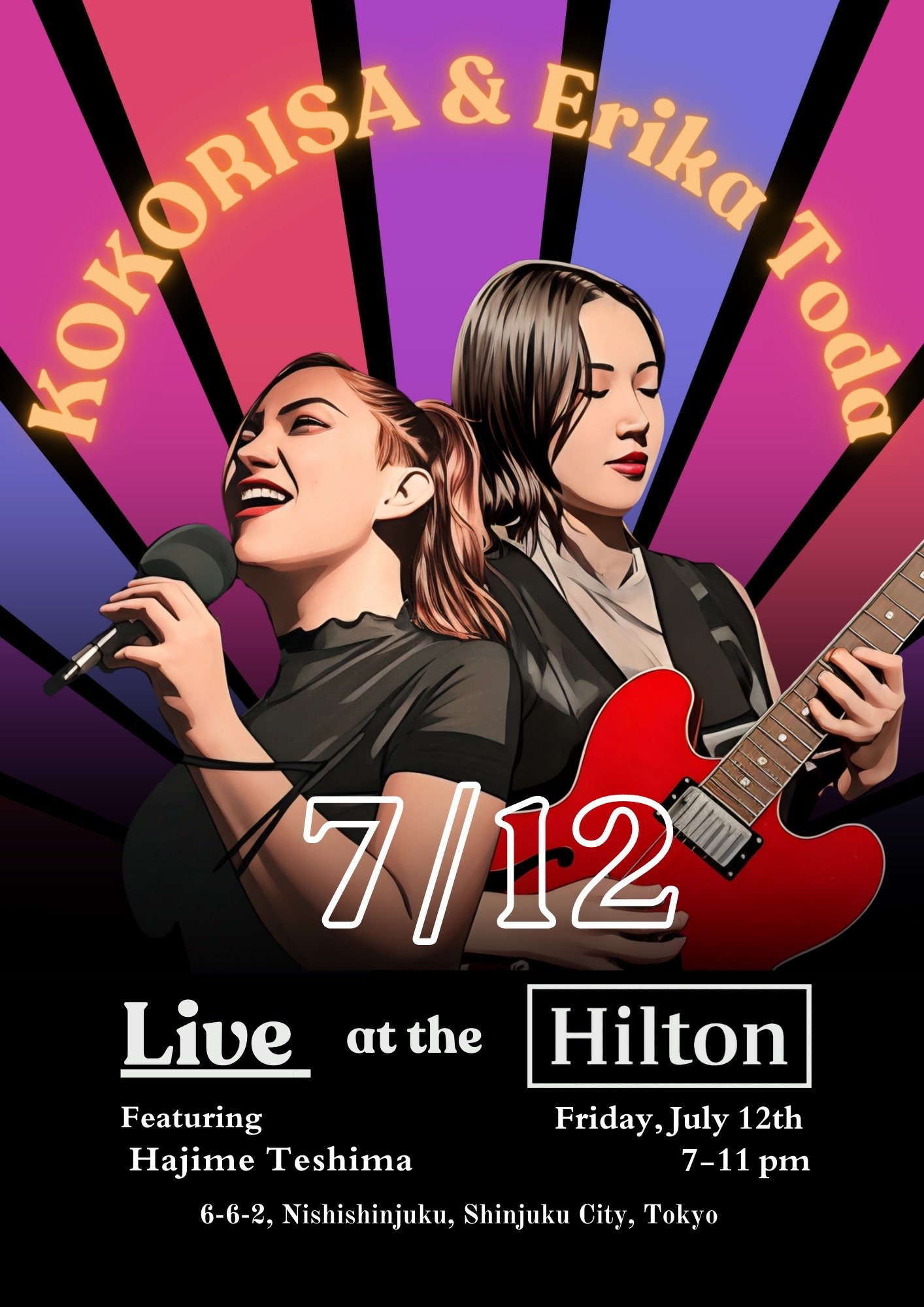

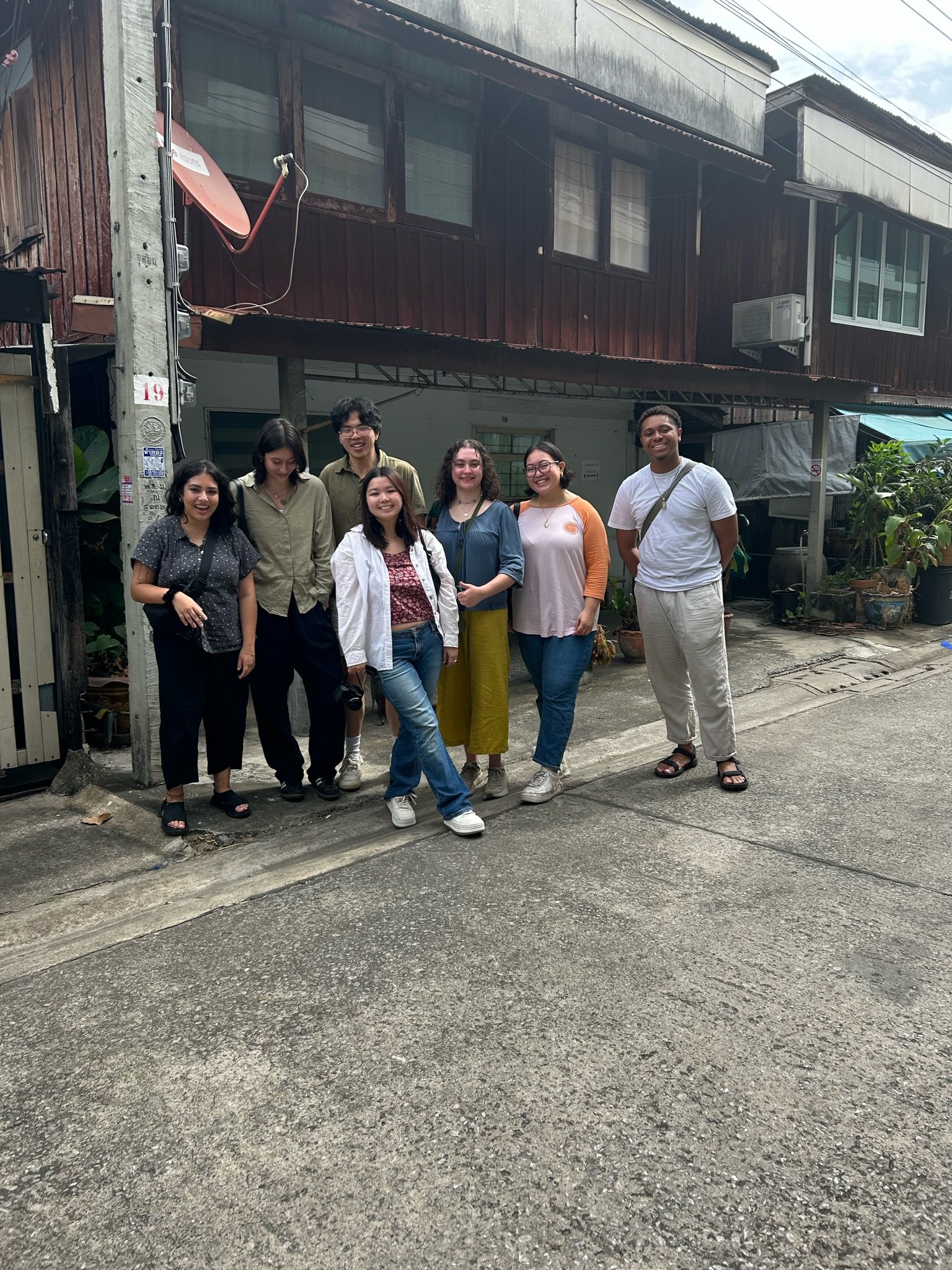

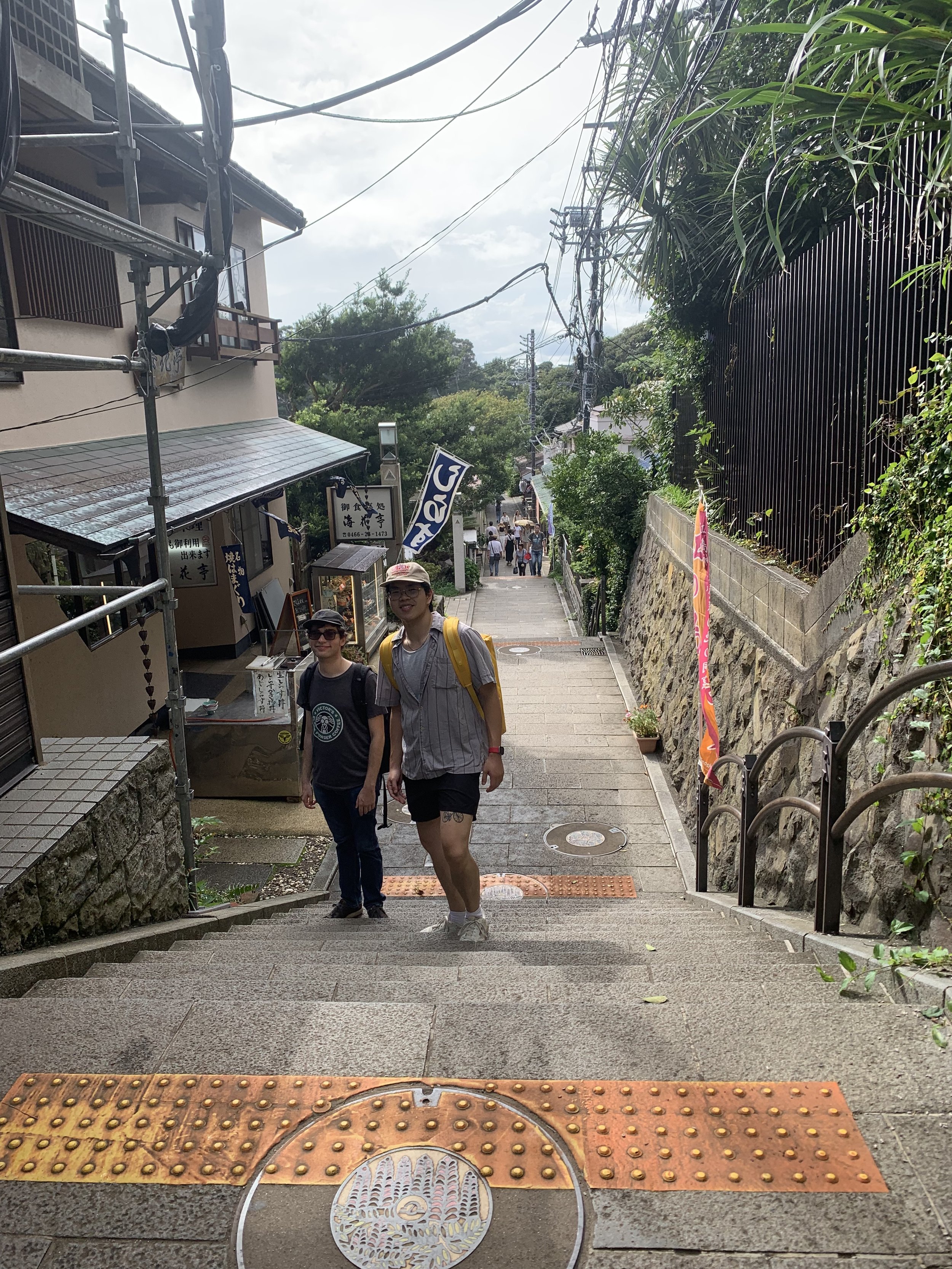







![We plan; [Life] laughs](https://images.squarespace-cdn.com/content/v1/5ff5d7777072bf61b2286c94/1613414707735-PBDZR9ENUW2YVQJXNEVT/DSC04546.JPG)


